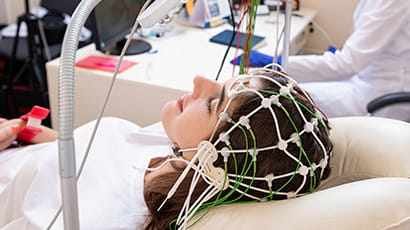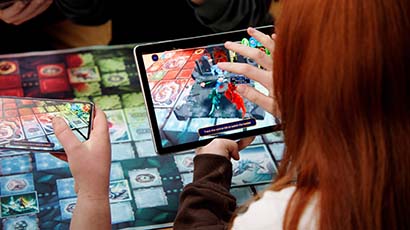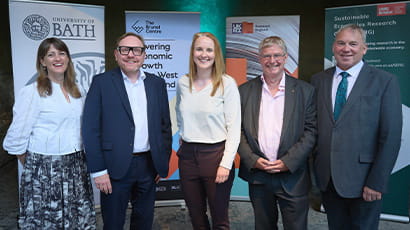Tech entrepreneurs' research to improve Team GB hopeful's prosthetic leg socket

Two young entrepreneurs at the University of the West of England (UWE Bristol) are working on improving the design of prosthetic legs and their sockets in collaboration with an athlete. Working in Bristol Robotics Laboratory (BRL) with Dr Appolinaire Etoundi, Mike Rose and Mayur Hulke are using technology to help develop a more comfortable prosthetic socket for Paralympics hopeful Tania Goddard.
Mrs Goddard is an above-knee amputee who is part of the British Shooting Talent Pathway Programme for Team GB and hopes to compete in the Paralympic Games, either in Tokyo 2020 or Paris 2024.
Two years ago, she approached Dr Etoundi, who is Senior Lecturer in Mechatronics at UWE Bristol and uses inspiration from systems found in nature to optimise rehabilitation devices such as prosthetic limbs. Mrs Goddard asked him to develop a socket to house her prosthetic leg that avoids common discomfort experienced with existing models, such as chafing or excessive temperatures.
With a background in mechanical engineering, Dr Etoundi is working to identify the cause behind this discomfort and use technology to come up with solutions.
“The aim is to develop an intelligent socket that will adapt to the patient's condition through the use of artificial intelligence (AI) and composite materials to determine when there are fluctuations in temperature and pressure within the socket,” said Dr Etoundi, who works in BRL, which is based on the University's Frenchay campus.
Mike Rose, who is a robotics student at UWE Bristol, is to provide an innovative design able to measure internal changes occurring inside the socket, using sensors. It will do this by collecting the data and passing it through a deep learning algorithm before processing the information into a useable format.
This data will be used to enable the design of a smart socket to provide improved comfort for the wearer as well as giving a detailed analysis of the system's daily operation.
Rose said: “Our current research involves looking into electromyography (EMGs) and mechanomyography (MMGs) sensors and understanding how they react to the subtle movements of human muscles. Working very closely with Dr Etoundi, we are currently using the data from EMG sensors to see how we can manipulate robotic systems such as artificial lower limbs and prosthetic sockets.”
Mayur Hulke, working alongside user experience researcher Diana Kviatkovskaja (pictured), is focused on developing a form of Artificial Intelligence that enables the technology to work proactively in adjusting to, and supporting each individual patient's needs.
Hulke said: “We are now able to combine biological human sensory systems with smart external limbs and this will be helping individuals to overcome certain physical limitations and, in some cases, restore their quality of life.”
Mrs Goddard, who used to work as a police community support officer (PCSO) in South Bristol, had her leg amputated in 2012 due to a medical condition. Despite learning very quickly to use her new prosthetic limb, she has been unable to find a socket that is pain-free.
“After 15 NHS sockets in two years and being told they were unable to help me lead a normal life, I thought I had to face living the rest of my life in a wheelchair,” she said.
As part of the research project conducted by Dr Etoundi, she has walked around the Frenchay campus wearing one of her prosthetic legs on a socket containing specially designed sensors detecting where rubbing occurs, as well as fluctuations in temperature.
“This work is giving me real hope to be able to walk again, and it could help thousands of amputees across the world, because if they can get a socket design to fit me, then it will fit anyone. All I ever wanted to was to be able to go back out on patrol as a police officer and be a proper mum to my children,” said Goddard.
The entrepreneurs Goddard is working with are also developing bio-inspired prosthetic devices and robotic exoskeletons. On 4 May, they take part in Bristol Museum's Leonardo da Vinci exhibition, in line with the famous artist's interest in skeleton, muscles, and movement.
Mayur Hulke will be showcasing his tracking motion software using a web camera and how this can be used to control the motion of an artificial limb. Meanwhile Mike Rose will be demonstrating how a robotic clamp closes in response to sensors on somebody's upper arm that detect muscle movement when the person clenches their fist.
Related news

12 December 2025
UWE Bristol’s environmentally conscious and student-focused accommodation wins three awards
Purdown View, the world's largest certified Passivhaus student accommodation development, has been recognised at Property Week Student Accommodation Awards.

25 November 2025
Health-tech start up MyCelsius launches breakthrough cooling tech for hot flushes developed at UWE Bristol’s Launch Space
A pioneering Bristol-based health-tech company developing cutting-edge cooling technology for hot flushes has credited UWE Bristol’s Launch Space incubator with playing a key role in accelerating its product development.

14 November 2025
Lecturer wins prestigious Times Higher Education award for innovation in teaching
A senior paramedic science lecturer at UWE Bristol has been named the most innovative teacher of the year in the Times Higher Education Awards 2025.

13 November 2025
Alliance Medical and UWE Bristol launch UK’s first PET-CT postgraduate certificate
In a move set to transform imaging education, Alliance Medical (AML) and UWE Bristol have joined forces to co-design and develop the UK’s first PET-CT Postgraduate Certificate (PG Cert).

13 November 2025
New AI research to revolutionise animal welfare
A UWE Bristol research project will combine behavioural science and AI to create technology that understands not only what animals do, but how they feel.

29 October 2025
UWE Bristol academic unveils breakthrough in energy-efficient AI at NATO science forum
Dr Jonathan Lancelot has developed a new form of AI that could transform how intelligent machines operate in space, defence, and remote environments.

07 October 2025
Academic playing role in project to find hidden graves in Mexico using drone technology
A UWE Bristol lecturer is playing a part in a project using drone technology to locate concealed graves in Mexico.

01 October 2025
New funding for researchers to develop trustworthy clinical AI for assessing brain activity
Researchers have received funding from UK Research and Innovation to help bring their innovative brain-monitoring AI technology closer to real-world use.

11 September 2025
New study to investigate augmented reality as an intervention for emotionally based school avoidance
A UWE Bristol researcher will support a new study exploring whether an augmented reality board game can help young people with emotionally based school avoidance (EBSA).

22 August 2025
A decade of Future Space: How UWE Bristol’s enterprise zone is powering innovation and economic growth
Tracey John, Director of Research and External Engagement, reflects on the impact of Future Space and its role as a launchpad for cutting-edge companies shaping the future of how we live and work.

11 July 2025
Wound dressings developed with support from UWE Bristol to be launched by global firm
Technology that a team of UWE Bristol scientists helped develop to aid the healing of chronic wounds will be used in new ‘smart dressings’ being launched by global medical company.

03 July 2025
Research lab The Brunel Centre opens to power sustainable and inclusive growth for the West of England
A new data and research centre designed to support sustainable and inclusive growth and industrial strategy in the region, has officially launched.






